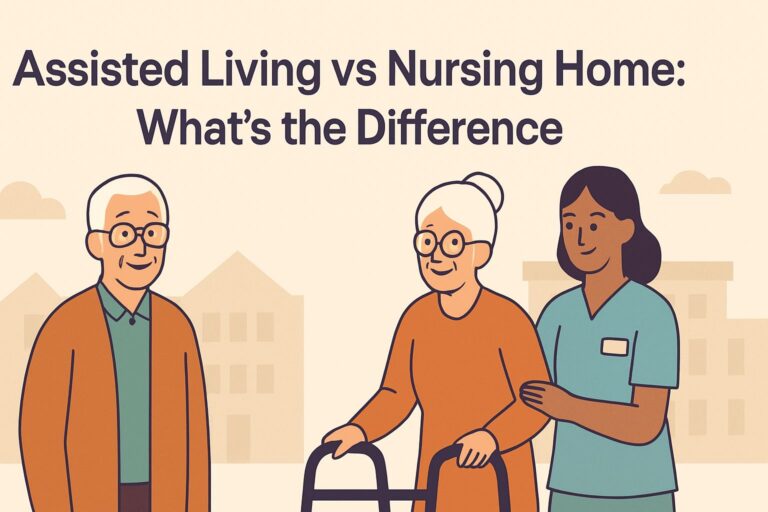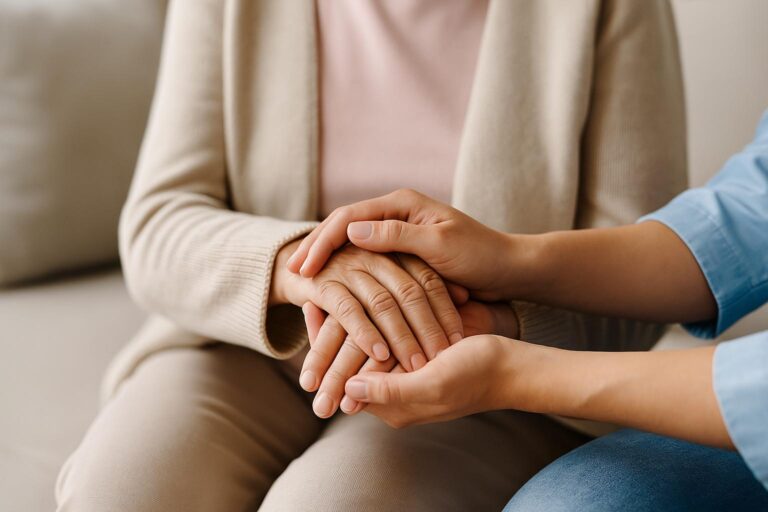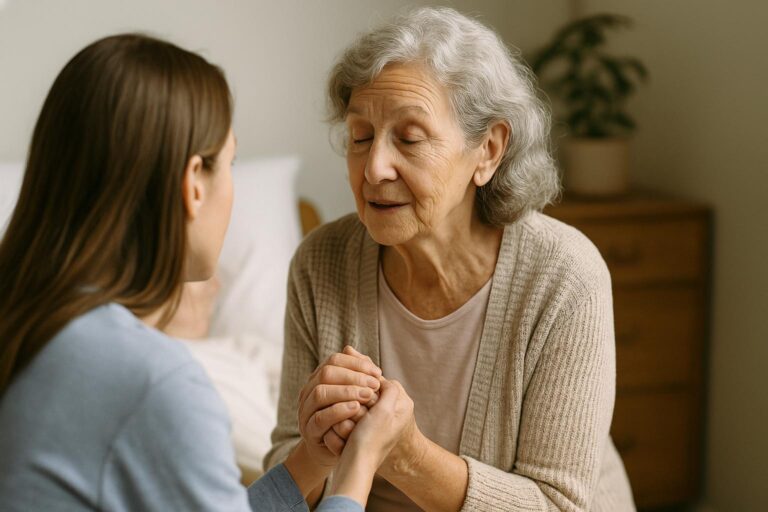What Are the 7 Stages of Lewy Body Dementia?
If someone you love has been diagnosed with Lewy Body Dementia, or you’re starting to notice changes that worry you, I want you to know — you’re not alone. I’ve walked this road with many families, and while each journey is different, the emotions are often the same: confusion, fear, grief, and a deep longing to understand what’s happening.
Lewy Body Dementia, or LBD, doesn’t follow a neat timeline. It shifts. It surprises. And it wears many faces — sometimes it’s memory loss, sometimes it’s movement issues, and sometimes it’s things you can’t quite put into words. But for families and caregivers, having a general idea of the stages can make all the difference in how you prepare, respond, and support your loved one.
We often talk about seven stages — not because every person moves through them exactly the same way, but because it helps us make sense of the changes. Think of them like mile markers. They won’t predict the exact day or hour something will happen, but they help us see what might be coming down the road.
I’ll walk you through each one of the 7 stages of Lewy Body Dementia, not just with information, but with heart — because that’s what caregiving demands.
Stage 1: No Noticeable Symptoms
At the very beginning, Lewy Body Dementia is quietly at work — but no one knows it yet. There are no obvious symptoms. No red flags. Life carries on as usual, and the person seems completely themselves.
I remember one family telling me, “Looking back, maybe there were signs… but at the time, we thought it was just age.” And that’s the thing — any little changes are so subtle, so easy to dismiss, that they usually go unnoticed. This is what makes LBD so tough to catch early on.
What’s happening inside, though, is the slow buildup of abnormal proteins called Lewy bodies in the brain. These start to collect in areas responsible for memory, thinking, and movement. But on the outside? The person is independent, engaged, social. No one suspects a thing.
This stage can last months or even years. Often, a diagnosis doesn’t come until later — sometimes not until Stage 3 or 4 — because this first stage is more about what isn’t seen than what is.
But if you’re reading this with a sense that something’s “off” and you can’t quite explain why… trust that instinct. Families know when something shifts, even before the doctors do.
Stage 2: Mild Cognitive Changes
This is where the little things start to catch your attention. It might be a moment of confusion in the middle of a familiar routine. Maybe your loved one forgets a name they’ve never missed before. Or they start asking the same question twice in the same conversation.
At first, it’s easy to chalk these things up to normal aging. And honestly, many people do. But with Lewy Body Dementia, there’s something different in the way these changes show up — they fluctuate. One day, your loved one might seem perfectly sharp. The next, they’re forgetful, distracted, even distant. And then they’re back again. That inconsistency becomes one of the biggest emotional tolls on families — the not knowing which version of them you’ll get that day.
In this stage, many caregivers tell me they start keeping quiet mental notes. “That was strange,” they’ll think. “She’s never done that before.” Maybe it’s trouble with multitasking or misplacing items. Maybe it’s just a new look in their eyes — a little more hesitation, a little less certainty.
And then there’s the sleep. This stage often brings on vivid dreams or physical movement during sleep — what’s called REM sleep behavior disorder. Sometimes a spouse will say, “He started acting out his dreams in the middle of the night,” long before any memory issues were even noticed. It’s strange, unsettling, and often overlooked.
This is usually the point where families start seeking answers — and that first doctor’s visit gets scheduled.
Stage 3: Noticeable Cognitive Decline
This is where the changes become harder to ignore. Friends may start noticing. Conversations might feel off. Tasks that used to come easily now take more effort — cooking a familiar recipe, handling bills, following a TV plot. The person is still very much themselves, but something’s different.
I remember a woman named Clarice whose husband used to read the newspaper front to back every morning. One day, she told me, “He looked at the headlines for a few minutes, then folded it up. Said it was too much effort.” That was the moment she knew things were shifting.
In this stage, memory lapses become more consistent. Problem-solving slows. The person may get lost in familiar places or feel overwhelmed by decisions. They might also start hallucinating — seeing things that aren’t there — or believing things that don’t make sense. And these aren’t fleeting moments. They’re persistent enough to cause confusion, even fear.
It’s also common for mood and personality to change. Someone once easygoing might become irritable or anxious. They may withdraw socially or become suspicious. And again — these symptoms may ebb and flow, which can make it all the more confusing for caregivers.
This stage often marks the point where families begin to need help. Whether it’s setting up reminders, managing medication, or simply being present more often, caregiving starts to become part of everyday life.
Stage 4: Increasing Physical and Cognitive Symptoms
By this point, Lewy Body Dementia is affecting both the mind and the body in more visible, disruptive ways. Your loved one may begin having trouble with movement — shuffling steps, muscle stiffness, or a tremor in the hands. It can look a lot like Parkinson’s, which makes sense, since both conditions share the same underlying cause: those abnormal Lewy bodies in the brain.
Cognitive symptoms also deepen. There’s more confusion now, especially in unfamiliar places or when routines change. Someone might forget how to get dressed properly, or they may struggle to follow a simple sequence of tasks like brushing their teeth. Hallucinations may become more frequent — not always frightening, but often bewildering.
One man I worked with believed there were children in his home who needed to be fed. His wife, heartbroken, would gently reassure him that everything was okay. These moments aren’t just about the person with LBD — they wear down the caregiver too.
During this stage, it becomes harder for your loved one to live independently. They might need help bathing, dressing, or preparing meals. You might notice weight loss from forgetting to eat, or small injuries from falls or bumps.
It’s also common for sleep to become severely disrupted — some people are up during the night, wandering, confused, even trying to leave the house. As a caregiver, your rest becomes fractured too, and you may find yourself running on empty.
This is when many families start looking into home care support or adult day programs. It’s not an easy decision — but it’s often a necessary one to protect both your loved one and your own health.
Stage 5: Severe Decline and Dependence
This stage is where Lewy Body Dementia tightens its grip. The person you love may now require help with almost every part of their daily routine. Dressing, bathing, toileting, eating — all of it may need hands-on support. They’re not just forgetful now — they’re confused about where they are, what day it is, even who people are.
And I want to pause here and say: this stage is incredibly hard. Not just for the person living with LBD, but for you. You may feel like you’re losing them a little more each day. Sometimes they recognize you, sometimes they don’t. One moment they smile and say your name, and the next they’re asking where their long-deceased parent is.
I once sat with a caregiver whose mother looked right at her and said, “You’re kind — remind me again, are you the nurse?” The daughter smiled, nodded, and said, “Yes, Mom. Just here to take care of you.” Sometimes love is meeting someone where they are, not where you want them to be.
Physically, you’ll notice more stiffness, more falls, and often very little speech. Communication becomes difficult, and the frustration that comes from that — for both of you — is deep. Even eating may become a challenge, as swallowing becomes harder and food loses its appeal. Weight loss is common, and dehydration can be a serious concern.
This is usually the stage where full-time caregiving becomes essential. Whether at home or in a care facility, around-the-clock support is often needed. It’s not a sign of giving up — it’s an act of love to ask for help when the load becomes too heavy to carry alone.
Stage 6: Late Stage and Bedridden
By this point, your loved one is likely no longer walking. They may be confined to a wheelchair or, more often, bedridden. Muscles grow weaker. Joints stiffen. The body becomes fragile. Most communication is gone, or limited to faint sounds, short words, or eye movement. But even here — even now — there can still be connection.
I’ve sat beside many beds in this stage. Sometimes a gentle squeeze of the hand or a familiar voice reading softly from a favorite book can bring a flicker of recognition, a calm breath, or the trace of a smile. Those moments, though brief, are everything.
This stage is marked by total dependence. Your loved one needs help with every function — turning in bed, cleaning, eating, and keeping comfortable. Swallowing may become unsafe, and food often needs to be pureed or given through a feeding tube. Breathing can become shallow or labored. They may sleep more than they are awake.
Care now focuses almost entirely on comfort. You’ll likely be working closely with a medical team or hospice care, who can help manage pain, avoid infections, and preserve dignity. One of the most powerful things I ever heard a hospice nurse say was, “We can’t stop the dying — but we can soften the landing.”
This is also a time of deep reflection for families. You may grieve for the person you once knew, even as they are still physically here. That’s normal. That’s love in action.
Stage 7: End of Life
This is the last stage — and it’s the one that no one is ever quite ready for, even when they think they are. In these final days or weeks, the body begins to shut down. Your loved one may no longer respond, their eyes may stay closed most of the time, and their breathing may take on a pattern that’s slow and uneven. This is called the “active dying” phase.
At this point, comfort is everything. The goal isn’t to cure — it’s to ease. Soft music, low lights, familiar voices, a gentle hand resting on theirs — these are the small mercies that matter now. Hospice care becomes your closest partner, helping manage any pain or discomfort and guiding you through what to expect.
Some families choose to stay close around the clock. Others take turns. I always tell families: there’s no perfect way to do this. The way you show up is the right way. Don’t measure your love by whether you’re there at the exact last breath. Measure it by the countless ways you’ve cared, comforted, and held on through every hard moment.
You may notice changes in skin color, long pauses in breathing, or a coolness in the hands and feet. These are all signs that the body is gently letting go. And when that moment finally comes — it’s quiet. Often peaceful. A kind of stillness that settles into the room.
Let yourself grieve. Let yourself feel. And know this: if you’ve walked someone through all seven stages of this journey, you have given a gift that words will never fully capture. You didn’t just watch it happen — you carried them through it.
Closing Thoughts
If you’ve read this far, it likely means you’re walking alongside someone you love through Lewy Body Dementia — or you’re preparing yourself for what might come. Either way, I want you to hear this clearly: what you’re doing matters.
Caring for someone through LBD is not easy. It demands a level of strength, patience, and love that few truly understand unless they’ve lived it. There will be days when you feel helpless, overwhelmed, even angry — and that’s okay. You are human. And you’re doing something deeply human: showing up for someone, day after day, even when the path is unclear.
These seven stages aren’t just about decline — they’re about presence. About being there through the confusion, the moments of laughter, the tears, the quiet hand-holding, and yes, even the final goodbye. Every stage you’ve walked through is proof of your love.
So if no one has told you lately: you’re doing an extraordinary thing. Take care of yourself too. Ask for help when you need it. And remember — love is the thread that carries us all the way through.
Share This Article:






